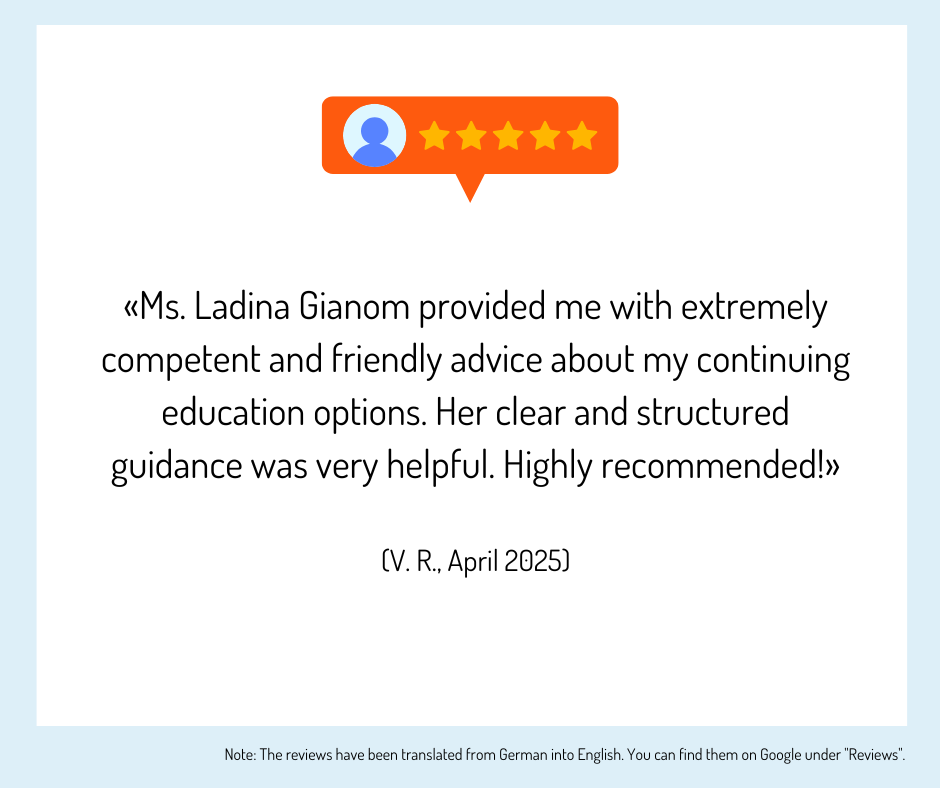Non-verbal communication: seminars, training, providers and offers at a glance
Non-verbal communication: radiate competence
Questions and answers
Who is the target group for a course in non-verbal communication?
The target group for a course in non-verbal communication are people who want to take a closer look at the impact of their non-verbal communication. This can also be important for professional impact, e.g. for managers in business or employees in education, administration and security areas (migration, police, justice, etc.).
How long do seminars on non-verbal communication usually last?
Training providers generally offer seminars on non-verbal communication that last one to two days. Occasionally these also last longer, but then usually as part-time or private continuing education, further training. Enquire with the providers.
What does the non-verbal communication teaching material contain?
The non-verbal communication teaching material includes the following topics:
- Know your own body language Use paraverbal and non-verbal signals effectively
- Learning to see and understand the non-verbal signals of others
- Recognizing feelings and emotions from body language
- Creating moods: using the voice purposefully
- Recognize non-verbal signal patterns and anticipate and control the course of communication
- Use non-verbal communication channels such as gestures, touch, spatial distance and vocal characteristics
- Using non-verbal means of expression consciously and with the right timing
What is a good example of non-verbal communication?
A good example of non-verbal communication is when you don't meet the person you were expecting on a blind date. In most cases, you can't hide this so well from nervousness and disappointment that the other person doesn't notice. For most people, non-verbal communication takes place completely automatically alongside verbal communication. Only actors or professional speakers are able to use their posture, gestures and facial expressions to support the effect of their words.
What are possible verbal communication examples?
When you communicate with someone, you are not just telling them something through the spoken word (verbal communication). An example of verbal communication is a normal conversation in which you ask how the other person is doing. So in the style of: "Hello, how are you?". But there is also non-verbal communication.
What can you achieve with "communication body language"?
"Communication Body Language" helps people to better understand the overall situation and thus to better adapt the content of the conversation and the intonation of the voice to the situation. Body language is the best interpretation of the behavioral psychology of individuals and groups. That is why body language is so important for us humans.
What non-verbal communication exercises are there?
Try out the following non-verbal communication exercises:
- Eye contact as a partner exercise
- Hold a conversation, but avoid eye contact
- Swap roles
- Having a conversation with eye contact again
- Exchange experiences
- Different positions on the perception of communication
- One person lies down and the other stands during communication
- One person lies and the other sits
- Role reversal
- Exchange of experiences
What is the difference between verbal and non-verbal communication?
Verbal communication refers to the use of words to convey messages. It can be spoken or sung, loud or soft, verbal or computer-generated. Non-verbal communication refers to any type of communication that takes place without words. Verbal and non-verbal communication are therefore fundamentally different.
Are there seminars that can improve your own non-verbal communication?
Using body language in a targeted manner and using non-verbal communication to appear more convincing, credible and interesting is not as difficult as many people imagine. You just need to know what is important and what methods you can use to emphasize what you are saying. In order to achieve this, some extremely interesting seminars are offered that will enable you to captivate your audience. The different focal points of the individual courses help you to decide on the right seminar, for example to conduct more successful negotiations, to appear more convincing and authentic as a politician, to appear competent as a lecturer or speaker or to score points in job interviews.
Non-verbal communication examples: What is non-verbal communication?
Non-verbal communication, i.e. non-linguistic communication, often referred to as body language in everyday life, encompasses much more than the mere language of the body. Non-verbal communication examples include facial expressions, gestures, proxemics (closeness and distance), posture, habitus (appearance and appearance), timing and ideomotor skills (uncontrollable physical processes such as pulse, breathing, twitching, sweat, red cheeks).
Do you also offer company seminars on non-verbal communication?
For many companies, it is important that their employees are not only personable, but also convincing. This is because customers need to be convinced quickly, especially in the sales force, and they need a strong and confident presence and the feeling that they are not being put at a disadvantage by their counterparts. This is why some training providers and schools also offer seminars for companies on non-verbal communication, in which they learn how to use their facial expressions, posture and gestures to work on their appearance and appear more competent.
Non-verbal meaning - what does this mean?
"Non-verbal meaning" is the opposite of verbal meaning. Verbal communication refers to everything that is spoken or written with words. It is therefore about what is actually said or written. In non-verbal communication, you send non-verbal signals to the other person via the various communication channels, which tell them something about your feelings, thoughts and emotions through your body language.
Experiences, evaluations and opinions on training / further education
Haven't found the right training or further education yet? Benefit from educational advice now!
Further training is not only important in order to maintain or increase professional attractiveness, investing in training or further training is still the most efficient way to increase the chances of a pay rise.
The Swiss education system offers a wide range of individual training and further education opportunities - depending on your personal level of education, professional experience and educational goals.
Choosing the right educational offer is not easy for many prospective students.
Which training and further education is the right one for my path?
Our education advisory team will guide you through the "education jungle", providing specific input and relevant background information to help you choose the right offer.
Your advantages:
You will receive
- Suggestions for suitable courses, seminars or training programs based on the information you provide in the questionnaire
- An overview of the different levels and types of education
- Information about the Swiss education system
We offer our educational counseling in the following languages on request: French, Italian, English
Register now and concretize your training plans.

Immediately to the right training
Attraktive Services für Swisscom Mitarbeitende
Kostenlose Services
» Bildungsberatung (Wert: CHF 150.–)
Bildungs- und Businessratgeber (Wert: CHF 175.–)
» Rabatte
Attraktive Rabattierungen seitens der Bildungsanbieter.
» Massgeschneiderte Bildungsangebote
Ohne grossen Zeitaufwand den besten Trainer, Coach oder Schulungsanbieter finden
Bildungsangebot Schweiz
Aus über 700 Bildungsanbietern das richtige Bildungsangebot finden



